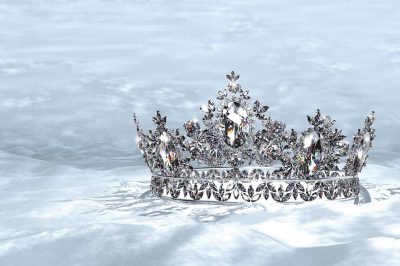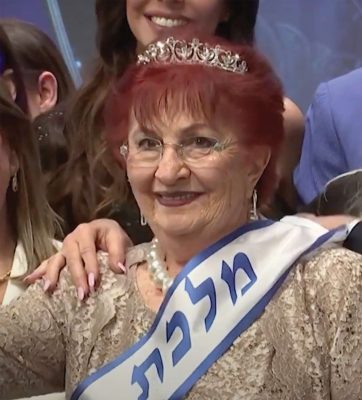×


We have detected your country as:
Please click here to go to the USA website or select another country from the dropdown list.
by: Cheryl Hauer, International Vice President
 On November 16, 2021, Israel hosted a unique, annual event that is a remarkable celebration of life—with just a touch of glam. The Miss Holocaust pageant was held in Jerusalem, putting 10 contestants on stage to vie for the prestigious title. The event is the brainchild of Shimon Sabag, director of Yad Ezer L’Haver (Helping Hand to a Friend), an organization that cares for at-risk children and other needy in Israel, particularly Holocaust survivors. Sabag is convinced of the event’s importance as he watches the contestants during rehearsals, having a good time being pampered while laughing and enjoying the company of those who have a shared painful history. Yet tears fill his eyes as each contestant recounts her story, reminding her listeners that she is there because she wants to tell the world to remember, to never forget, to celebrate life.
On November 16, 2021, Israel hosted a unique, annual event that is a remarkable celebration of life—with just a touch of glam. The Miss Holocaust pageant was held in Jerusalem, putting 10 contestants on stage to vie for the prestigious title. The event is the brainchild of Shimon Sabag, director of Yad Ezer L’Haver (Helping Hand to a Friend), an organization that cares for at-risk children and other needy in Israel, particularly Holocaust survivors. Sabag is convinced of the event’s importance as he watches the contestants during rehearsals, having a good time being pampered while laughing and enjoying the company of those who have a shared painful history. Yet tears fill his eyes as each contestant recounts her story, reminding her listeners that she is there because she wants to tell the world to remember, to never forget, to celebrate life.
When the idea was first made public in 2012, 300 women applied to participate. The number was eventually narrowed to 14 contestants ranging in age from 74–97.
When those 14 took to the stage in 2012, they were greeted by over 600 spectators, there to honor women who personify the indomitable Israeli spirit. When the second pageant was held in 2013 at the Romema Sport Arena in Haifa, 2,500 attendees showed up to cheer for the 18 contestants aged 70–94. The 14 finalists in 2016’s pageant were serenaded by the debut performance of a choir made up entirely of Holocaust survivors, a choir that has since gone on to gain international recognition.
Journalist Lihi Lapid, wife of Israeli Foreign Minister Yair Lapid, was a judge at the 2015 event, and afterward remarked: “I think we chose them by their will for life, by their energy. They were so happy to be there on stage and actually eager to tell their story. There was something so touching by the way they just wanted us to understand, that we need to celebrate life.”
Unfortunately, however, the celebration is not without its critics. Some have panned the event as an inappropriate way to remember the horrors of the Nazi genocide. Colette Avital, a former Israeli diplomat who runs a center that advocates for Holocaust survivors, feels it is improper to have beauty pageants for women who have experienced so much suffering. She has called the competition “ridiculous, grotesque, showing a lack of respect” for survivors.
Participants, of course, vehemently disagree. Although they enjoy the pageantry, the make-up and rhinestones, flowers and tiaras, they are grateful that the event does not avoid the seriousness of the issues, the pain and horror of the past. This year’s contestants discussed forced labor camps, pogroms and the ghastly experiments performed by Josef Mengele. Many trembled with emotion as they spoke, yet underlying every testimony was a conviction to live life to its very fullest, to be grateful for each breath and each blessing in life, to stand up for what is right and to overcome. As young women during the Holocaust, these individuals endured unspeakable pain and loss, and yet have rebuilt their lives, raised families, contributed to the building of the nation and want their voices heard.
According to Judy Baumel-Schwartz, director of the Finkler Institute of Holocaust Research at Bar-Ilan University, scholars today acknowledge that for women in the Holocaust, the female collective experience was unique. At one time, many believed that separating the stories of Jewish men and women under the Nazi regime was a blow to their joint fate or to Jewish solidarity. Although male and female victims of Nazi cruelty were equally persecuted and faced the same ultimate fate, research on gender and the Holocaust is no longer viewed in a negative light. Today, it is recognized as critical to an in-depth understanding of the effects of the Holocaust on both genders.
The Nazi regime targeted all Jews for persecution, but women were frequently subjected to brutal acts that were unique to the gender of the victims. Jewish women accompanied by children were especially vulnerable and subject to sadistic behavior from guards. They were often included in the first groups to be sent to the gas chambers. In ghettos and concentration camps, authorities deployed women into forced labor that they were physically incapable of performing, which often led to their deaths. German medical researchers used Jewish women as subjects of sterilization experiments and other horrific human experimentation. Women were particularly vulnerable to beatings and rape. Pregnant Jewish women were often forced to submit to abortions or sent to give birth in makeshift nurseries where conditions guaranteed the death of the infants.
 Light, Love and a Future
Light, Love and a FutureCountless books and papers and decades of research have yet to uncover the totality of the horror experienced by these women. Sabag says his mission is to in some way give survivors “a piece of the youth that was stolen from them.” And he is succeeding. This year, 87-year-old Kuka Palmon gleefully declared she felt like “a teenage girl” after being pampered by a team of beauticians and dressed by professional stylists. “After what I went through in the Holocaust,” Palmon said, “I never dreamed that I could get to where I am, with a big family: two kids, four grandchildren and two great-grandchildren. And yet here I am, at this great age, 87. It’s a godly thing, it is indescribable.”
This year’s winner, Salina Steinfeld, 86, accepted her title dressed in gold and wearing pearls. She moved to Israel in 1948 after surviving Nazi attacks. She is now a great-grandmother herself and plans to use her title to “bring light to all Israel.”
The granddaughter of a 2021 contestant said people deserve to see “how much beauty there is in these women who went through such horror.” She believes the pageant is truly a way of honoring her grandmother and the other contestants. “We will show them how much we love and appreciate them. Thanks to them, we have a country…we have a future.”
Photo Credit: Click on Photo To See Photo Credit
All logos and trademarks in this site are property of their respective owner. All other materials are property of Bridges for Peace. Copyright © 2025.
Website Site Design by J-Town Internet Services Ltd. - Based in Jerusalem and Serving the World.